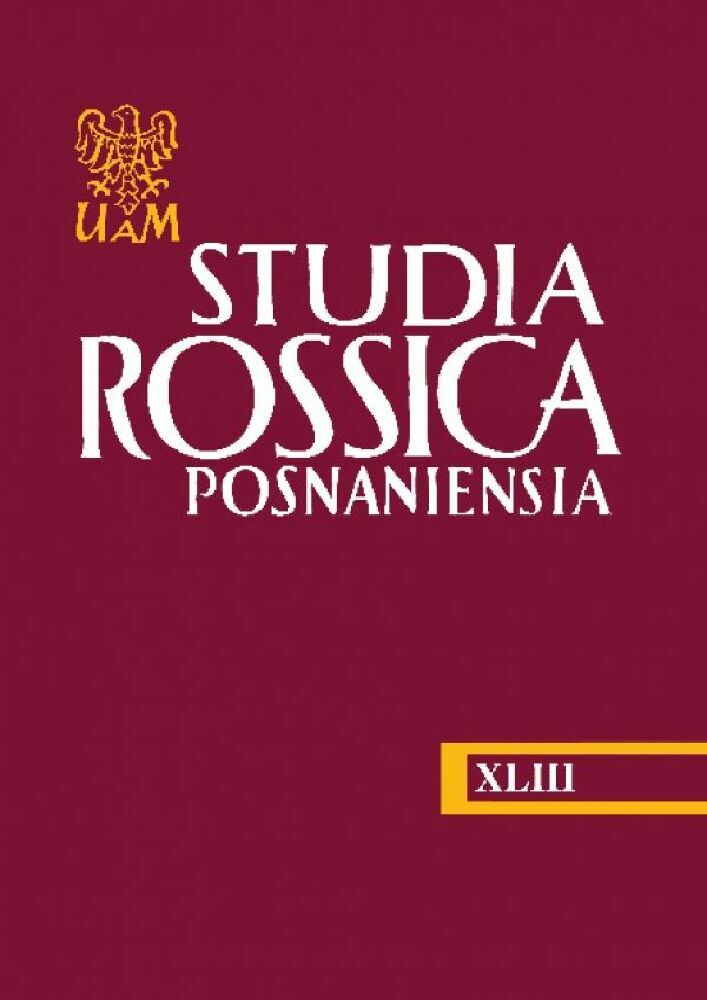Abstrakt
In this paper, the view is proposed that human culture appears fundamental in resolving the problem of ‘the human condition’. Its holistic nature comprises all tangible and intangible aspects, including artefacts, language and communication. It is the culture-language complex which is responsible for the generation of both collective and individual human identity via its locality expressed in a plethora of tangibleintangible manifestations. The regionalism of this complex ought to result in special care of both institutions and individuals who, by demonstrating active involvement on a local scale, are co-responsible for the maintenance of local cultural-linguistic identity. Its vitality is, in turn, more than significant for the maintenance of identity on a larger (e.g. national, global) scale. The aforementioned aspects of regionalism are discussed here on the basis of a review of the content of an encyclopedic outline of Kashubian culture (Bedeker) authored by Tadeusz Bolduan.Bibliografia
Ethnobiology. 2011. Red. E. N. Anderson, D. M. Pearsall, E. S. Hunn i N. J. Turner, N. J. Hoboken: Wiley-Blackwell.
Balick M. J., Cox P. A. 1997. Plants, people, and culture: the science of ethnobotany, New York: Scientific American Library.
Bolduan T. 2002. Nowy bedeker kaszubski, Gdańsk: POLNORD — Wydawnictwo OSKAR.
Borgatt i S. P., Everett M.G. 1999. Models of core / periphery structures, ”Social Networks”, No. 21, s. 375–395.
Community networks: lessons from Blacksburg, Virginia. 2000. Red. A. M. Cohill, A. L. Kavanaugh, 2nd ed. Norwood, Mass.: Artech House.
Companion encyclopedia of anthropology. 1994. Red. T. Ingold, London: Routledge.
Diringer D. 1968. The alphabet: a key to the history of mankind, New York: Philosophical Library.
Encyklopedia języka polskiego. 1991. Red. S. Urbańczyk, Wrocław: Ossolineum.
Ethnobiology for the future: linking cultural and ecological diversity. 2016. Red. G. P. Nabhan, Tucson, AR: The University of Arizona Press.
Fennell D.A. 1999. Ecotourism: an introduction, London: Routledge.
Handbook of cultural geography. 2002. Red. K. Anderson, M. Domosh, S. Pile, i W.T. Thrift, London: SAGE Publications.
Holden J. 2015. The ecology of culture: a report commissioned by the Arts and Humanities Research Council’s Cultural Value Project, [w:] źródło elektroniczne: www.ahrc.ac.uk/documents/project-reports-an
Karpatschof B. (2000). Human activity. Contributions to the anthropological sciences from a perspective of activity theory, Copenhagen: Dansk Psykologisk Forlag.
Landowski R. 2002. Nowy bedeker kociewski, Gdańsk: POLNORD — Wydawnictwo OSKAR.
Moore J. D. 2009. Franz Boas: culture in context, [w:] Visions of culture: an introduction to anthropological theories and theorists. Red. J. D. Moore, 3rd ed. Walnut Creek, CA: Altamira Press, s. 33–46.
Nowaczek A. 2010. Ecotourism: principles and practices, “Annals of Tourism Research” 37.1, s. 270–271.
Parag Khanna. 2016. Connectography: the future of global civilization, New York: Random House.
Polska kuchnia regionalna. Kuchnia kaszubska. 2015. Ożarów Mazowiecki: Olesiejuk SP. Z O.O.
Puppel S. 2009. Uwagi w sprawie konieczności ochrony dziedzictwa kulturowo-językowego, czyli od ojcowizny i ojczyzny do wspólnoty światowej, „Acta Pomerania”, nr 2, s. 101–108.
Puppel S. 2013. The imperial life of natural languages, [w:] Investigations in teaching and learning languages. Red. D. Gabryś-Barker, E. Piechulska-Kuciel i J. Zybert, Heidelberg: Springer-Verlag, s. 3–8.
Puppel S. 2015. Język w podmuchu, posiewie i przepływie: uwagi w sprawie synergii porządków komunikacyjnych w kontekście ekoglottodydaktyki, [w:] MOTEK. Motywy ekolingwistyczne: w stronę ekoglottodydaktyki. Red. S. Puppel, “Scripta de Communicatione Posnaniensi. Seria: Prace Naukowe Katedry Ekokomunikacji UAM”, t. VII, Poznań: Zakład Graficzny UAM, s. 143–150.
Puppel S. 2017. Ecoli[s]². Essays and notes on ecolinguistic synergy and synthesis, “Scripta de Communicatione Posnaniensi. Seria: Prace Naukowe Katedry Ekokomunikacji UAM”, t. VIII, Poznań: Zakład Graficzny UAM.
Robertson R. 1995. Glocalization: time-space and homogeneity-heterogeneity, [w:] Global modernities. Red. M. Featherstone, S. Lash i R. Robertson, London: Sage Publications, s. 25–44.
Scheyvens R. 1999. Ecotourism and the empowerment of local communities, “Tourism Management”, No. 20, s. 245–249.
Skurzyński P., Kamiński R. 2008. Dziedzictwo kulturowe północnych Kaszub, Wejherowo: Starostwo Powiatowe w Wejherowie.
Stout D. 2011. Stone toolmaking and the evolution of human culture and cognition, “Philosophical Transactions of the Royal Society of London B”, No. 36, s. 1050–1059.
Sychta B. 1967. Słownik gwar kaszubskich na tle kultury ludowej, t. I–VII. Wrocław: Ossolineum.
The encyclopedia of ecotourism. 2001. Red. D. B. Weaver, UK: Cabi Publishers.
The oral history reader. 1998. Red. R. Perks, A. Thomson, London: Routledge.
Twigger - Ross C. L., Uzzell D. L. 1996. Place and identity processes. “Journal of Environmental Psychology’, No. 16, s. 205–220.
Upton C., Widdowson J. D. A. 2006. An atlas of English dialects, 2nd ed. London–New York: Routledge.
Vivelo F. R. 1978. Cultural anthropology handbook, New York: McGraw-Hill.
Wakelin M. F. 2008. Discovering English dialects, Oxford: Shire Publications.
Walker C., Sherwood K. 2003. Participation in arts and culture: the importance of community venues. Washington, D.C.: Urban Institute.
Licencja
PRACE PUBLIKOWANE W CZASOPIŚMIE DOSTĘPNE SĄ NA LICENCJI CREATIVE COMMONS:
Uznanie autorstwa-Użycie niekomercyjne-Na tych samych warunkach 4.0 Międzynarodowe.
Autorzy tekstów przyjętych do publikacji w czasopiśmie „Studia Rossica Posnaniensia” są zobowiązani do wypełnienia, podpisania i odesłania na adres redakcji umowy o udzielenie nieodpłatnej licencji do utworów, z zobowiązaniem do udzielania sublicencji Creative Commons.
Zgodnie z umową, autorzy tekstów opublikowanych w czasopiśmie “Studia Rossica Posnaniensia” udzielają Uniwersytetowi im. Adama Mickiewicza w Poznaniu niewyłącznej i nieodpłatnej licencji oraz zezwalają na użycie sublicencji Attribution-NonCommercial-ShareAlike 4.0 International (CC BY-NC-SA 4.0).
Autorzy zachowują prawa do dalszego, swobodnego rozporządzania utworem.
Autorzy, którzy wykorzystują w swoim tekście cudze utwory (np. ilustracje, fotografie) proszeni są o dostarczenie do redakcji czasopisma zgody na publikację.
Użytkownicy internetu uprawnieni są do korzystania z utworów opublikowanych po 2015 roku “Studia Rossica Posnaniensia” tylko w celach niekomercyjnych, pod następującymi warunkami:
https://creativecommons.org/licenses/by-nc-sa/4.0/
Uniwersytet im. Adama Mickiewicza w Poznaniu zachowuje prawo do czasopisma jako całości (układ, forma graficzna, tytuł, projekt okładki, logo itp.).
